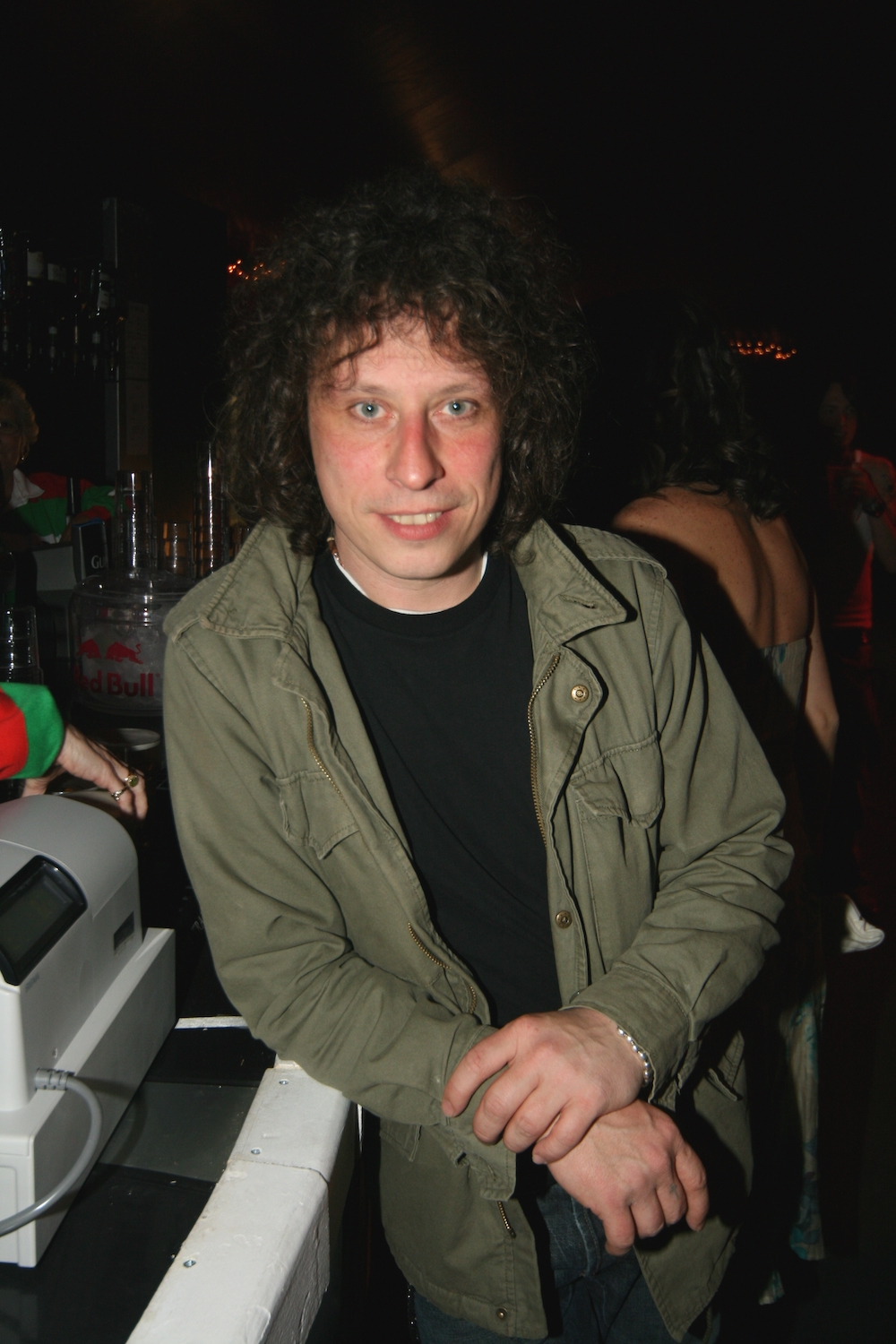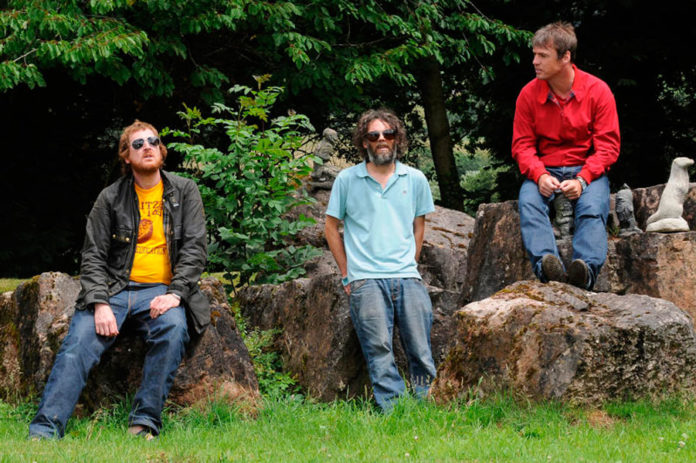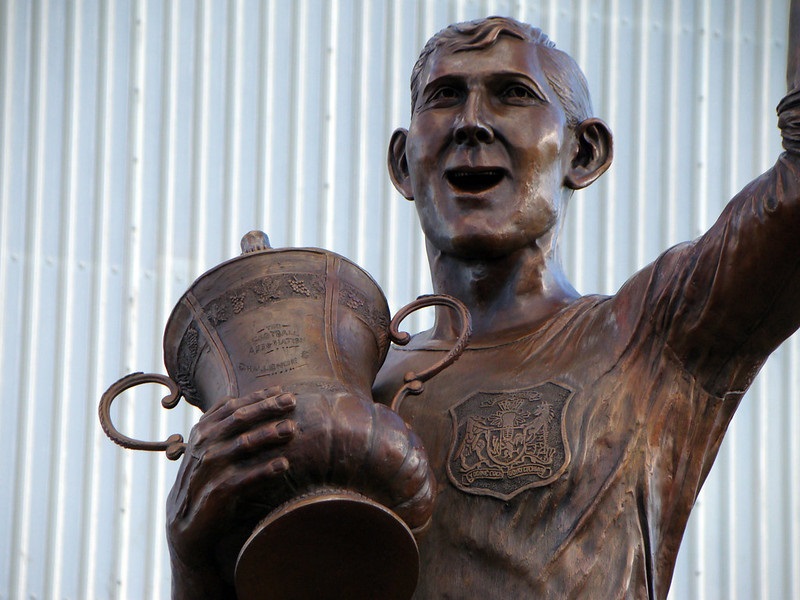The ‘stolen’ FA Cup, the miners’ folk song and the Welsh supergroup
David Owens
It’s a story deeply rooted in the South Wales coalfields.
A tale of resilience, pride and honour.
It was 12 years ago that the single ‘I’ll Be There’ was released by Welsh supergroup The Stand.
It’s a song which ultimately pays tribute to two homegrown heroes from Wales.
The group contained former Catatonia guitarist Owen Powell, Super Furry Animals’ bass player Guto Pryce, Funeral For A Friend drummer Ryan Richards, and former member of Merthyr band The Pocket Devils, Jonny Owen.
Their rollicking indie rock reworking of the classic Cardiff City chant, itself based on a Welsh mining folk song, was released to raise funds towards a permanent tribute to Cardiff City’s 1927 FA Cup winning captain, Fred Keenor.

The genesis of the story lies with another Bluebirds’ legend, Super Ted, or more precisely the cartoon superhero’s creator, Mike Young.
The City fan, who now lives in the US, where he has built an impressive animation empire, contacted the club and asked why the team didn’t have a Welsh song to run out to.
The club thought it was a good idea to record a track so approached Jonny, the musician turned broadcaster and film director, who had received much acclaim for his emotive short film about the club, which was screened ahead of Cardiff City’s FA Cup Final appearance against Portsmouth at Wembley Stadium in 2008.
Jonny set about putting together a band of fellow Cardiff City supporting musicians to record the song.
The original line-up of The Stand included Stereophonics’ drummer Stuart Cable, who was instrumental in the group’s plans, until his untimely death in June 2010.

The death of the much-loved, larger than life drummer left the band in a quandary over whether they should continue the venture after Stuart’s passing. Ultimately, they felt it only fitting to his memory and legacy that they carry on.
“After the terrible news of Stuart’s death, the three of us (Jonny, Guto, Owen) met at the club to discuss what to do but we were unanimous we would continue,” recalls Owen.
“We got Ryan on board to play drums and recorded the single over three days in the summer of 2010 at Monnow Valley Studios in Monmouth.
“It was Stuart who had secured the recording sessions so it was tinged with sadness,” adds the guitarist. “But we felt certain it was what he would have wanted and everyone involved in the project dedicated the song to the memory of Stuart. He will always be remembered forever as a dear friend and fellow Bluebird.”
At this point Owen remembers they were only thinking of the song being used as the run-out music for the team. However, it was soon to take on a life of its own.

As well as being an iconic and enduring Cardiff City chant, ‘I’ll Be There’ also lays claim to being one of the oldest football songs in the world, adapted from the Welsh mining folk song – ‘When The Coal Comes From The Rhondda’, sung by South Wales miners during the General Strike of 1926.
Jonny Owen, the director of critically acclaimed football movies ‘I Believe In Miracles’ and ‘Don’t Take Me Home’, lays out the history of the song in his short film about the club’s history screened before the 2008 FA Cup Final.
“The year before the FA Cup Final in 1927 was the general strike the South Wales miners stayed out longer than anyone else in the country,” he says. “They were literally starved back to work. When they returned they defiantly sang a song that is still sung on the terraces today – ‘when the coal comes from the Rhondda down the Taff Vale railway line, when the coal comes down the Rhondda , I’ll be there, when the coal comes down the Rhondda I’ll be there. with my little pick and shovel I’ll be there’.”
According to Owen Powell the biggest problem they faced was that there was no recorded version of the original song.
“Luckily I remembered the choruses from the years I spent singing it on the terraces at Ninian Park, while amazingly Jonny knew the verses because he remembers it from being sung in the pubs of Merthyr, where he’s from, in the ‘70s and ‘80s,” he recalls.
Momentum
As momentum gathered after The Stand had put their own stamp on the song, reinventing it as a three minute indie rock anthem, the song took on a whole new purpose.
“Jonny played it to Eddie Piller, the owner of Acid Jazz Records who agreed to release it,” explains Owen. “He’s a really nice bloke who understood immediately the social history of the chant. The song is about coal coming down the Taff Vale railway to Cardiff, and Eddie was really interested in both the song’s industrial and football history.”
With ‘I’ll Be There’ recorded and a record company on board, the decision was then made that all monies raised would go towards the Fred Keenor Fund, the charitable campaign set up the same year by the Cardiff City Supporters Trust to raise funds to create a statue of the legendary Cardiff City captain, who fought in the First World War.

“Keenor was an extraordinary man,” says Owen. “He was injured in the Battle of the Somme and was told he’d never play again. Not only did he overcome his injuries, but he captained his home town club to victory in the 1927 FA Cup final.
“We wanted to honour his memory with every penny raised from the single going towards the statue. In these days of modern footballers, here was a man who lived out his life in modest means and was dearly loved by the people.”

To promote the single Owen and Jonny set off on a promotional tour, which included TV shows such as Soccer AM, but also a selection of Cardiff City loyal pubs around South Wales.
These included Barry Dockers, The Mountain Ash Inn, The Ninian in Cardiff and Burgess Green pub in Port Talbot.
“There was no real band, it was just me and Jonny DJing and doing Q&As. We asked Cardiff City if we could have a player come around with us to sign a few autographs, although when we told them about the pubs where we were appearing they said, ‘no way’,” he laughs, recalling the club’s reaction when they detailed the earthy watering holes they were appearing at.
However, what the club offered was nevertheless impressive.
“Every club who wins the FA Cup gets a full size replica of the cup,” says Owen. “So, the club let us take their FA Cup around the pubs with us. Mind you they didn’t have a case for it and we had to carry it around in a black bin bag, which was a little mad.”

Things were to get even madder when they arrived in Port Talbot.
“So we’re doing a DJ set at the Burgess Green pub, which is the home of the PVM, the Port Talbot Pure Violence Mob, so we knew it was going to be a bit lively,” the musician remembers.
“Port Talbot is a divided town, half is Cardiff, half is Swansea, but this pub was a Cardiff City pub.
“The evening was going well, there’s a couple of hundred lads in there. People were having their picture taken with the FA Cup. Everyone has had a few beers and it’s getting lively. The next thing we know the FA Cup has gone missing. Somebody had walked off with it.
“I think Jonny was playing The Sex Pistols’ ‘Anarchy In The UK’ at the moment we realised it had disappeared,” he remembers
“We were both in a panic. Jonny cut the music, took to the mic and said right we’ve had a great night, but somebody’s nicked the FA Cup, and we need it back. Nobody comes forward and by now we’re bricking it, thinking we’re going to need to call the police.
“The next thing we know somebody has run into the pub and called us outside. He starts pointing to the Chinese restaurant across the road.
“We walked into the restaurant and there’s a bunch of lads who were in the pub sitting at a table in the restaurant with the staff having their picture taken with the FA Cup.
“I have never been more relieved,” he laughs. “Imagine being known as the lads who lost the FA Cup.”
As with all good tales, this one has a happy ending.
Two years later, in November 2012, a statue of Fred Keenor holding the FA Cup was unveiled outside the Cardiff City Stadium.
As far as we are aware Cardiff City’s replica FA Cup is still safely housed in a display cabinet in the stadium.
Support our Nation today
For the price of a cup of coffee a month you can help us create an independent, not-for-profit, national news service for the people of Wales, by the people of Wales.





